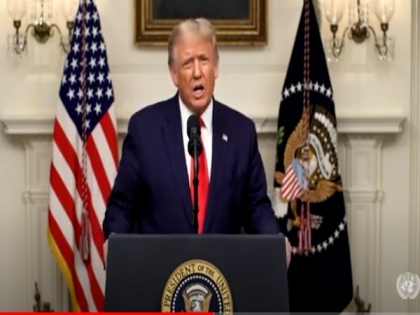Will the UAE-Bahrain normalization with Israel accord help or hinder peace in the Middle East?
By ANI | Published: September 23, 2020 09:36 AM2020-09-23T09:36:26+5:302020-09-23T09:55:08+5:30
While US President Donald Trump has hailed the agreements recently signed between the United Arab Emirates and Bahrain to normalize relations with Israel as "the dawn of a new Middle East", the Secretary of PLO's Executive Committee Saeb Erekat strongly condemned them, describing the so-called "Abraham Accord" as "an Arab dagger-a poisonous dagger-in the back of Palestinians and as destroying the possibility of negotiations". So it is not clear yet if the new deal will help or hinder peace in the troubled region of the Middle East.

Will the UAE-Bahrain normalization with Israel accord help or hinder peace in the Middle East?
While US President Donald Trump has hailed the agreements recently signed between the United Arab Emirates and Bahrain to normalize relations with Israel as "the dawn of a new Middle East", the Secretary of PLO's Executive Committee Saeb Erekat strongly condemned them, describing the so-called "Abraham Accord" as "an Arab dagger-a poisonous dagger-in the back of Palestinians and as destroying the possibility of negotiations". So it is not clear yet if the new deal will help or hinder peace in the troubled region of the Middle East.
The UAE and Bahrain will recognize and establish diplomatic relations with Israel. For the first time in their history, the Emirates and Israel are beginning air travel between them and, for its part, Bahrain has opened its airspace for those flights. While politicians and ordinary people continue to weigh the potential benefits or pitfalls of the Accord, Israeli Prime Minister Benjamin Netanyahu has announced the freezing of the annexation of the West Bank.
It should be mentioned that several groups and politicians, in the UAE, Saudi Arabia and Bahrain on many occasions expressed an interest in establishing ties with Israel and vented frustration with the hard-line stand consistently followed by the Palestinians in the past decades. Over the years the Palestinians have relied on the support -political and financial- of Arab governments in their struggle for freedom and independence. But things have changed dramatically. The Gulf states are no longer a monolithic group and every state takes first into account its own interests and not the usual Arab rhetoric about the Palestinian cause.
Saudi Crown Prince Muhammad bin Salman back in 2018 during a meeting with Jewish community leaders in the US was quoted as saying that the Palestinian leadership "never missed an opportunity to miss an opportunity." Several Arab governments are exasperated with the never-ending conflict and the rejection by the Palestian leaders of all the plans proposed.
John B. Alterman, director of the Middle East Program at the Centre for Strategic and International Studies in Washington, asked about what prompted the normalization of relations between the UAE and Israel, said that Arab governments, following the "Arab Spring", decided that their principal threats were internal and not external and that the Arab - Israeli conflict was a political distraction. "In addition, the Israeli and Emirati governments share a wide range of security concerns. They both see Iran as a serious and enduring security threat. They both are hostile to political Islam and skeptical that greater democratization in the Arab world will lead to better outcomes. Because they see eye to eye on many adversaries, they share an interest in deeper intelligence sharing."
In the Middle East, the sands are shifting and Arab states have changed their outlook on national security threats, in view of the dangers posed by Tehran and Ankara, coupled with the stated intention of the US to reduce its military footprint in the region. It is a well- known secret that the secret services or the UAE and Israel were cooperating for some years now on the issues of terrorism and Iran and the recent Accord is certain to enhance this cooperation. Furthermore, the UAE considers Hamas as a terrorist orgzation and no longer supports financially the Palestinian Authority.
In a joint article, Dr Yoel Guzansky, Senior Research Fellow at the Institute for National Security Studies, and Ari Heistein, Research Fellow at the same Institute, write that "the normalization agreement exposes the UAE to criticism, provocations and potentially even threats to its national security from Iran, though Iran is not alone in its opposition to the agreement. Turkey has also criticized the UAE's recent steps, and it is possible that it will take action in response, such as providing increasing support (presumably funded by Qatar) to Islamists throughout the region that seeks to thwart the UAE's Middle Eastern agenda".
Many observers commented that the normalization agreement is a courageous step to fostering reconciliation and co-existence and boost UAE's image as a beacon of tolerance and moderation, which has been tarnished in recent years by various issues, including the Saudi-led campaign in Yemen, which humtarian orgzations describe as "the worst humtarian crisis in the world."
Furthermore, they point out that the UAE may now be able to get from the US advanced hardware such as F-35 fighter jets, armed drones and intelligence tools.
The Israeli Ambassador in Cyprus Sammy Revel described the Abraham Accord as "a landmark for peace and stability in the region" and added: "The accord provides a striking alternative to those radical forces that oppose peace and cooperation. Moreover, the Accord effectively strengthens the power of moderate voices in the face of fanaticism that extreme countries and their proxies sow across the region. It is an important stage in ending the conflict in the Middle East and beyond."
( With inputs from ANI )
Disclaimer: This post has been auto-published from an agency feed without any modifications to the text and has not been reviewed by an editor
Open in app